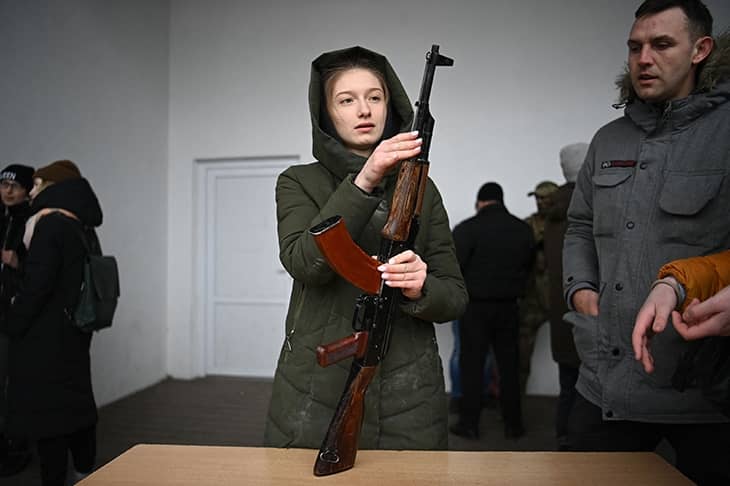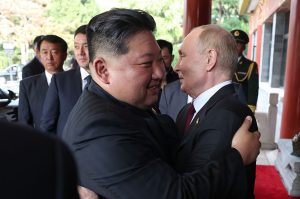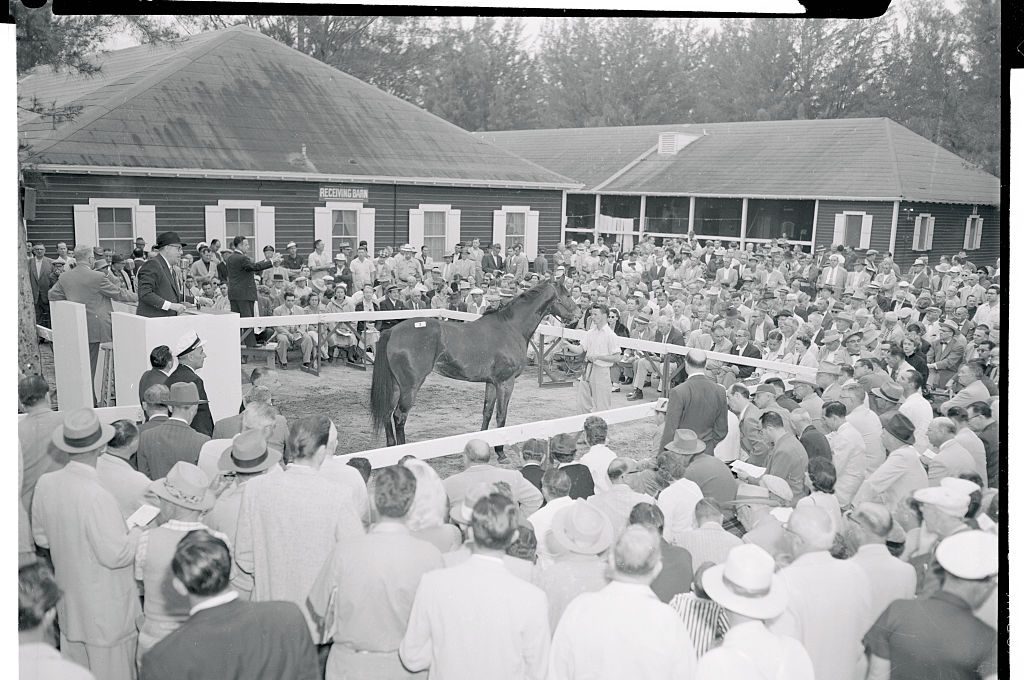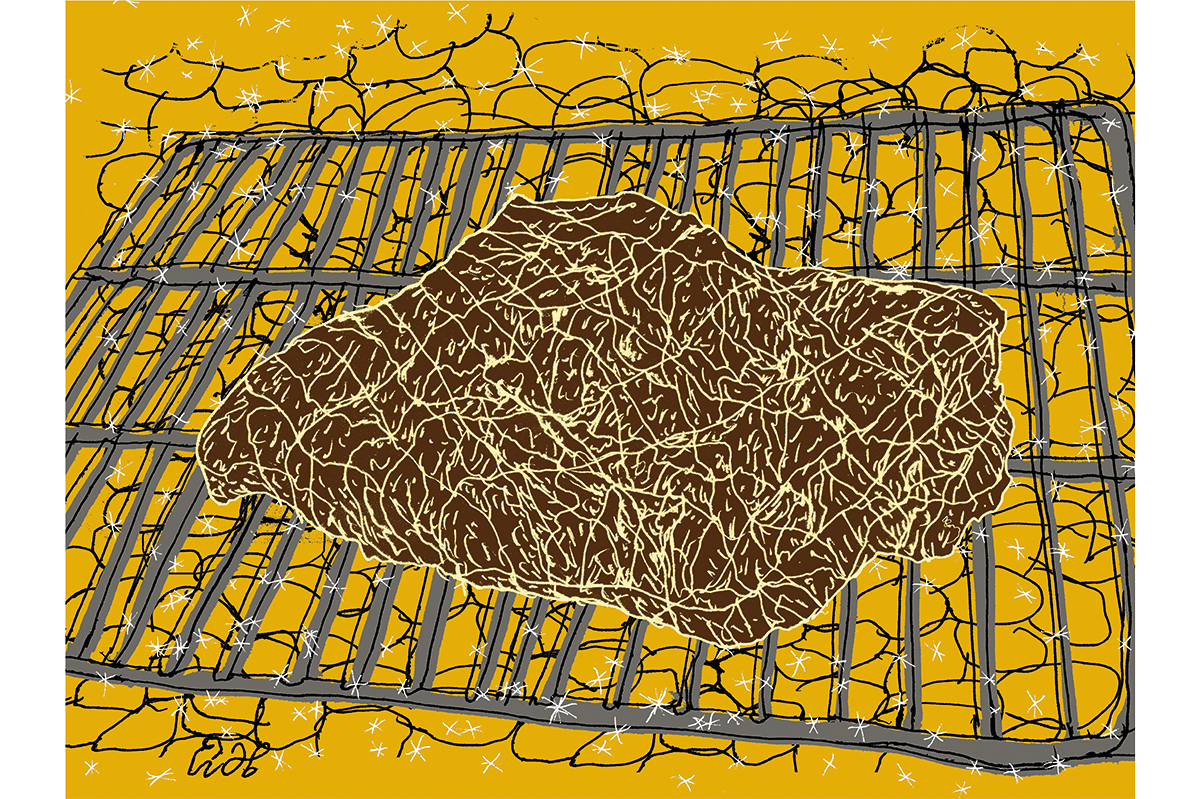For many of us war voyeurs watching the news with a glass of whiskey, admiration of the little-engine-that-could Ukrainian fighters is underwritten by unease. As families escape to safety, plenty of feisty Ukrainians are remaining behind to battle a far more powerful aggressor, and they’re not all men, either. The question nags, then: in the same circumstances, would we stick around to defend our homelands, or would we cut our losses and get out?
Earlier this month, that’s precisely what a Quinnipiac poll asked Americans. Some 7 percent answered “Don’t know.” But an astonishing 52 percent of Democrats predicted that they’d skedaddle. Among Republicans, a full quarter would carpool with the hightailing “to hell with this!” Democrats, while 68 percent would stand their ground — or think they would. Among all respondents, 55 percent would stay and fight, while 38 percent would flee. Scaled up, that would be 125 million Yanks storming from the Land of the No Longer Free and the Home of the Not Especially Brave all at once. Quite a stampede.
As Matthew Hennessey observed in the Wall Street Journal, these answers are especially surprising because nothing compelled these folks to tell the truth. People often deceive pollsters, especially when an honest reply seems socially unacceptable. That’s why Donald Trump’s victory in 2016 caught pollsters so unawares: many Trump supporters kept their ostensibly odious voting intentions to themselves. Those Quinnipiac respondents confronted only a pencil-pushing pollster, not a Russian tank crashing through their living room. Surely they’d have been tempted to lie to please — or to show a shred of self-respect. Jesus, they might at least have lied to themselves — imagining that, under duress, they’d rise to the occasion, even if this assumption entailed unwarranted optimism about the extent of their physical courage.
Given the overtly unattractive nature of the admission, we’re therefore obliged to regard the substantial proportion of the American citizenry who say they would not fight to defend their country in the event of a military invasion by a foreign power as an expression of sincere self-knowledge. Ergo, under attack, 38 percent of Americans would pile their SUVs high and join foreshortening tailbacks headed for Canada or Mexico, while wealthier families would clamber onto private jets and zoom off to bunkers well stocked with tinned paté in New Zealand.
With big-picture peace having prevailed for more than seventy years, most of us westerners have never been forced to decide whether to put our lives and bodily wellbeing on the line for our countries and compatriots. Recent immigrants are sometimes ardent converts to their adoptive lands, but the relationship to nation among the West’s native-born tends to be passive and transactional. (For many immigrants, the relationship is also more materially self-interested than emotional.) Most of us figure vaguely that where we live is OK; the country provides us with more or less what we need. Our primary contribution to the collective national interest is money, which we hardly donate out of niceness, and which even in quantity can’t compare to sacrificing a left leg. As for Democrats, for years a goodly number have denounced their country as an irredeemable cesspit of “systemic racism.” Why would you risk a cut finger for such an awful place, much less a hole in the chest?
And we’re accustomed to our comforts. Watching Ukrainian snipers on TV — who a month ago might have been IT consultants or shoe repairmen — we think: Ugh, they look cold. Why don’t they wear gloves? Preferably with silk liners and those little air-activated hand warmers. The filling in those sandwiches they’re wolfing down is pale and fatty, and I far prefer whole-grain bread. No colorful dash of rocket! Not even mustard! And do these folks have a nice claret at the ready for the evening? How do they while away the long hours after dark without Amazon Prime? How can they sleep in a concrete sewer pipe? I can only nod off under a down duvet while listening to my whale-song CD.
In last fall’s The Dying Citizen, Victor Davis Hanson proposed that the western concept of citizenship, with its balance of rights and obligations, had been steadily eroded. Globalization, mass unassimilated immigration and the left’s cultivation of self-disgust have steadily turned us into mere residents, with no fervent commitment to a shared culture and past. For plain old residents, country is a matter of convenience or accident. Nationality may confer a greater or lesser advantage, but it hardly calls up a passionate attachment or sense of duty. Our jet-setting elites are dedicated not to nations but to ideologies, whose promotion is all talk. While Putin has been brainwashing Russians into a mindless patriotism, our disavowal of patriotism has been equally mindless. We’re demoting our countries to mere coordinates, mere patches on a map. We westerners’ dry, shrugging, uninvested relationships to our own countries may be the perceived weakness that most emboldens Putin.
Truthfully, I’ve no idea how I’d respond as an American if the US were under attack, and if those poll respondents were honest with themselves the results would have been 98 percent “don’t know.” Extreme circumstances are prone to reveal things about character that are impossible to access in calmer times. The invasion of your home is apt to stir the primitive, animal emotions conspicuously on display in Ukraine. There’s no more ferocious a motivator than hatred — and there is such a thing; it bears little resemblance to whatever feeling underlies the mild verbal faux pas that’s currently prosecuted as “hate speech.” Ukrainians repeatedly testify to journalists that they’re not frightened but angry. I’ve a temper like Mount Vesuvius, so maybe facing a vicious, unprovoked military usurpation I’d be out on the streets ragingly rat-a-tat-tatting with my M16 (alongside a bunch of Republicans, apparently — though some of those Democrats might surprise themselves). But I’m as soft and spoiled as anyone. So for all I know, I’d instead be throwing a case of wine into a waiting SUV.
This article was originally published in The Spectator’s UK magazine. Subscribe to the World edition here.

























